

Most ebook files are in PDF format, so you can easily read them using various software such as Foxit Reader or directly on the Google Chrome browser.
Some ebook files are released by publishers in other formats such as .awz, .mobi, .epub, .fb2, etc. You may need to install specific software to read these formats on mobile/PC, such as Calibre.
Please read the tutorial at this link: https://ebookbell.com/faq
We offer FREE conversion to the popular formats you request; however, this may take some time. Therefore, right after payment, please email us, and we will try to provide the service as quickly as possible.
For some exceptional file formats or broken links (if any), please refrain from opening any disputes. Instead, email us first, and we will try to assist within a maximum of 6 hours.
EbookBell Team

5.0
78 reviewsGilligan's Island, created by Sherwood Schwartz, aired for three seasons between 1964 and 1967 on the CBS network. While the series was typically dismissed for its episodic inanity, author Walter Metz argues that this characteristic is precisely the source of the show's innovation as it produces a vibrant critique of dominant American values. In this analysis of Gilligan's Island, Metz reveals the inner workings of American television and society through an intensive look at the popular sitcom.
In twenty-one short sections, Metz investigates many aspects of Gilligan's Island: the narrative, the characters, the plot, and the performativity. Through multiple episode analyses and character examinations, Metz shows how the castaways' actions on the island held deeper meaning and illustrated American social customs. The book also looks at several different themes presented in the show and connects them to many literary traditions, including Shakespeare (The Tempest and Hamlet), existential theatre (Waiting for Godot), and classic American literature (Moby-Dick). Through this discussion, Metz examines the literacy of Gilligan's Island and the way it knowingly returns to certain tropes from high literature, masking their expression in a distinctly populist American idiom. Metz also addresses the legacy of Gilligan's Island and its profound effect on American television, as evidenced by popular contemporary shows like Survivor and Lost.
At one point in time, Gilligan's Island was the most syndicated show around the world, but few scholarly articles exist about it. Fans of the show and those interested in television history and popular culture will enjoy this playful and informative study that fills a gap in television history.